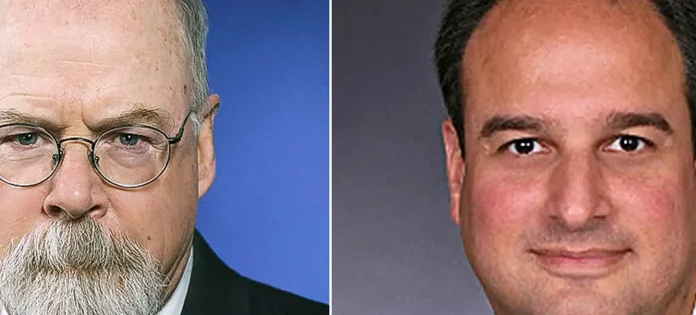The request of Special Counsel John Durham Wednesday for dismissal of the case against Michael Sussmann (former Clinton Campaign Lawyer) was turned down by Federal Judge Michael Sussmann. He directed that the trial continue as scheduled for next month.
Sussmann moved to dismiss the case in February. He was accused of making false statements about a federal agent. Sussmann pleaded not guilty.
U.S. U.S. District Judge Christopher Cooper described in a Wednesday court filing the charges against Sussmann brought to him last year by the Durham impaneled Grand Jury.
Cooper described the indictment against Durham in which Sussmann told James Baker (then-FBI General Counsel) in September 2016 that he was not doing any work for any client. He requested and held a meeting in which he presented “purported” information and “white paper” that allegedly showed a covert communication channel between Trump Organization (ALBANK) and Alfa Bank. Alfa Bank has close ties with Russia.
Cooper reported that Sussmann claimed that Baker was not there for any client. In fact, Sussmann had assembled the information and was communicating it to two clients: (1) Rodney Joffe (a technology executive) and (2) Hillary Clinton’s presidential campaign.
Cooper stated that Sussmann’s data was investigated by the FBI, who concluded that there wasn’t enough evidence for a channel between Trump campaign and Russian bank. ”
Cooper said that Sussmann’s sole argument for his dismissal was that “even if all the allegations of the Indictment are true, his purported misrepresentation about Baker was immaterial as a matter of law and therefore cannot support conviction.” U.S.C. 1001: Making false statements to federal agents.
Cooper stated that the court would deny the motion. Cooper noted that the U.S. Code’s standard of materiality is whether the statement “has an innate tendency or is capable of influencing either a discrete function or other function [of government] agency to which it was addressed “.
Cooper said that Sussmann’s statement to Baker, in which he stated that he wasn’t there for a client, “couldn’t have possibly influenced” the Bureau’s decision at the time to investigate whether or not to investigate Trump’s communications.
Cooper said that Sussmann “largely overlooks” the second, namely whether Sussmann’s statement could have an impact on ‘any other function’ of the agency.
Cooper stated that Sussmann would like to restrict this holding to statements made during an ongoing investigation. Cooper stated that Sussmann wants to limit this holding to statements made during an ongoing investigation. However, Sussmann doesn’t offer any legal authority.
Placement
In February, Sussmann’s legal team filed a motion asking the court to strike parts of Durham’s February 11, filing. This included the “Factual Background”, as it would “taint the jury pool.” ”
Cooper said that he would not strike any record at a status hearing last Wednesday. ”
According to the “Factual Background” filing dated February 11, 2016, Durham claimed that Sussmann gave information to two U.S. government agency from a tech executive trying to connect Donald Trump with Russia-based Alfa Bank.
Durham stated that Joffe and Sussmann, along with Joffe’s associates, “exploited” the internet traffic about a specific healthcare provider, Trump Tower and Trump Central Park West apartment building buildings, and the Executive Office of the President for the United States to “establish” an inference and “narrative linking Trump to Russia.”
Durham asserts that Sussmann’s billing records prove that he “repeatedly billed the Clinton campaign for work” regarding the Alfa Bank allegations.
Sussmann’s legal team, in its motion to “strike”, the allegations stated that Durham had done more than simply file a document identifying potential conflicts of interest. ”
Sussmann’s lawyers stated that the “special counselor” had filed a new case in the case.
Durham also filed a separate motion, arguing that there was no reason to “strike any part of his filing.” Durham also denied claims that his office had “intentionally attempted to politicize” the case. Durham supported the inclusion of “additional factsual details”. It was central to the proof of Sussmann’s “alleged criminal conduct.”










